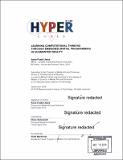Hypercubes : learning computational thinking through embodied spatial programming in augmented reality
Author(s)
Fusté Lleixà, Anna
DownloadFull printable version (19.81Mb)
Alternative title
Hyper cubes
Learning computational thinking through embodied spatial programming in augmented reality
Other Contributors
Program in Media Arts and Sciences (Massachusetts Institute of Technology)
Advisor
.Chris Schmandt
Terms of use
Metadata
Show full item recordAbstract
Computational thinking has been described as a basic skill that should be included in the educational curriculum. Several online screen-based platforms for learning computational thinking have been developed during the past decades. In this thesis we propose the concept of Embodied Spatial Programming as a new and potentially improved programming paradigm for learning computational thinking in space. We have developed HyperCubes, an example Augmented Reality authoring platform that makes use of this paradigm. With a set of qualitative user studies we have assessed the engagement levels and the potential learning outcomes of the application. Through space, the physical environment, creativity and play the user is able to tinker with basic programming concepts that can lead to a better adoption of computational thinking skills.
Description
Thesis: S.M., Massachusetts Institute of Technology, School of Architecture and Planning, Program in Media Arts and Sciences, 2018. Cataloged from PDF version of thesis. Includes bibliographical references (pages 116-120).
Date issued
2018Department
Program in Media Arts and Sciences (Massachusetts Institute of Technology)Publisher
Massachusetts Institute of Technology
Keywords
Program in Media Arts and Sciences ()